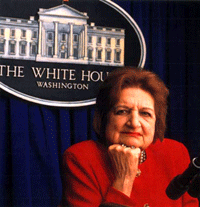
- Watchdogs of Democracy?
- Simon & Schuster (2005)
- Bookstore Finder
Journalism icon Helen Thomas has been covering the White House for six decades. One might have expected the octogenarian reporter to retire and take up, oh, say, gardening, but the weeds in Washington continue to multiply, encouraging her apparently unflagging zeal to yank them out at their roots.
Her determination has made her something of a celebrity -- an unlikely enfant terrible to those who would prefer to operate under a cloak of secrecy, and a hero to those who believe the duty of journalism is to hold the powerful to account. Her persistent questions, particularly about the war in Iraq, had her banished from her traditional front-row seat at presidential press briefings.
At the 2006 White House Correspondents' Association Dinner, attended by the president himself, satirist and Bill O'Reilly impersonator Stephen Colbert showed a video fantasy in which he plays the new White House press secretary (a job that's been taken by former Fox News correspondent Tony Snow) who handily shakes off other questioners but is haunted by Thomas, who follows him all the way to New York City.
Her fourth book, Watchdogs of Democracy?: The Waning Washington Press Corps and How It Has Failed the Public, chronicles her views on the failures of contemporary journalism.
Deborah Campbell: You've had a front row seat on the White House press gallery since Kennedy, and now you've been moved to the back of the room...
Helen Thomas: Only for press conferences with Bush. He doesn't want to call on me.
What does that say about his view of the press?
I'm reluctant to personalize it. No president likes the press, period. But Bush in particular wants to sanitize who he talks to. They give him a list of reporters to call on -- which I've never seen done before -- and he sticks to the script. He's afraid of my questions. On the one hand it makes me laugh, but it's also sad. A president of the United States ought to be able to handle any question. If they can't, then why are they there? My requests are very simple. Usually it's like, "Why?" "Why did you do it?" "What's it all about?" If you're putting people's lives at risk, you should be able to answer questions like that.
Do you think the U.S. press is tough enough on monitoring the centres of power at this point?
No, I think they fell down on the job. But I sense that they're getting their sea legs, coming out of their coma in light of the hurricane and Karl Rove and a few other things. So they might get back to being real reporters again. I think they're beginning to realize they let too many opportunities pass, that it's okay to get angry and to really challenge, which is their job. Reporters represent the last frontier in terms of questioning public officials. If we don't do it, it doesn't happen.
Do you recall a time or a moment in history when journalism was more heroic than it has been in recent years?
Every other time but this time. And it's because of 9/11. People wanted to be more patriotic and were afraid of rocking the boat. From there, we were segued into a war where reporters were worried about jeopardizing the troops. So there was a heavy cloud, and reporters had to fall in line for awhile. But they're coming out of it, thank goodness.
What are some of the main obstacles to doing good journalism at the moment?
Fear. Lack of courage. You want to keep your job. Maybe some corporate heads are breathing down your neck. You've got to feed the family and send the kids to college. There might be financial reasons and others, and maybe some reporters feel they shouldn't raise uncomfortable questions at a time when patriotism is demanded. But our job is to find out the truth. That's our only job.
At the moment it seems there are some cracks in U.S. foreign policy. Do you speculate as to where any of that is going?
Well, I think that we've got to pull the troops out of Iraq. We've got to stop killing. This is ridiculous. It's more than ridiculous. It's tragic. Wanton killing, killing and being killed -- for what? I think the administration wants to hang in there, but they actually believe they can win. I think that's a long shot, if anything. And what is winning anyway? Winning what? A Shiite theocracy? Is that what American soldiers are dying for? Furthermore, we've got to find out what terrorism is really about, find out the root causes. I think that it was right to go into Afghanistan and right to go after Bin Laden. But what about the bigger picture? Is it a religious war? Is it American policy that is really motivating these people? What is it? Figure that out, and deal with it.
Deborah Campbell writes on foreign affairs, art, politics and culture for national and international publications. She sometimes stays up till the wee hours to catch the Colbert Report on rabbit ears. A version of this interview originally appeared in Adbusters. ![]()




